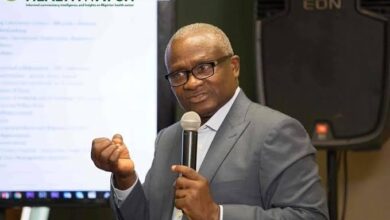Over One Billion People Live With Hypertension Globally- Ehanire

Minister of Health, Dr. Osagie Ehanire has said that over one billion people worldwide; representing more than 30% of the adult population are living with hypertension.
The Minister who was represented by the Director of Public health in the ministry, Dr. Alex Okoh disclosed this on Wednesday, May 17, 2023 at the commemoration of this year’s World Hypertension Day in Abuja.
Ehanire informed that, Hypertension is the leading cardiovascular disease and Non-Communicable Disease (NCDs) and is responsible for significant morbidity and mortality, with the low-and-middle-income countries responsible for nearly 80% of the global cardiovascular disease burden.
“Globally, more than 1 billion people worldwide are living with hypertension and this represents more than 30% of the adult population, of this number only 52% are aware of their condition while about 35% are on treatment and less than 14% have the blood pressure control”, he said.
He further expressed concern over the burden of hypertension that is disproportionately more in the low and middle-income countries in the decades due to the prevalence of risk factors such as tobacco use, physical inactivity, unhealthy diet, and harmful alcohol consumption.
“It is important to note that public awareness creation, education, routine screening at every opportunity, early detection and diagnosis, counseling and prompt provision of standard treatment and care are essential element for hypertension control otherwise hypertension can lead to fatal complications such as heart disease, heart failure, stroke, blindness, chronic kidney failure, dementia, e.t.c”, the Minister said.
In her message to commemorate the 2023 World Hypertension Day, the World Health Organization (WHO) Regional Director for Africa, Dr. Matshidiso Moeti said that in the African region, close to 40% of adults aged 30-79 years were hypertensive and only a quarter of these were on medications while optimal blood pressure control was only attained in 11% of patients on medication.
Moeti said people with hypertension will not have any specific signs or symptoms directly attributed to the condition.
“Symptoms are usually foreboding of damage on specific organs in the body including the heart, brain, eyes and kidneys resulting from poor control”, She explained.
The Health Expert said that Hypertension was an important risk factor for cardiovascular diseases (CVDs) mostly heart attack, stroke, and heart failure which account for a significant burden of premature mortality from NCDs.
“Every year, the global community commemorates the World Hypertension Day on the 17th of May. This year, the theme is Measure Your Blood Pressure Accurately, Control It, Live Longer. “This is aimed at drawing attention to combatting the low level of awareness of hypertension as well as the limited availability of calibrated devices for accurate blood pressure measurement.
“Hypertension is easy to diagnose and there are safe and cost-effective treatment including pharmacologic and behavior change interventions”, she said.
Moeti stated that, WHO had prioritised decentralized management and care for NCDs including management of hypertension, using the WHO Package of Essential Noncommunicable disease interventions for primary healthcare.
“We need to regularly check our blood pressure and incase it is raised, adhere to medications as prescribed by the health provider. We can fight hypertension and the responsibility starts with us as individuals and as communities, taking control of our health and well-being. We need to adopt healthy lifestyles such as reducing salt intake, increasing portions of fruits and vegetables consumption, increasing physical activity, and avoiding tobacco and excessive alcohol consumption”, she advised.
Moeti however called on governments in Africa to lead the way by implementing their commitments through policies and programs that address the root causes of hypertension, promote healthy environments, and improve access to healthcare services.
“This will require a significant investment in healthcare infrastructure, training of healthcare workers, and increasing access to affordable medications. Early detection through routine screening at all health service delivery levels is important and calibrated and validated blood pressure measuring devices should be available in all health facilities.”
Similarly, WHO Representative in Nigeria, Dr. Walter Kazadi Mulombo who was represented by the Technical Officer, Non Communicable Disease, WHO Nigeria, Dr. Mary Dewan stated that Since 2005, the World Hypertension Day has been commemorated every year on the 17
th of May.
Mulombo informed that the day was aimed at raising awareness and promoting hypertension prevention, ensuring early detection and prompt treatment:
“The theme is a reminder that hypertension, termed a ‘silent killer’ can be prevented or controlled when individuals adopt healthy lifestyles as well as measure and track their numbers consistently.
“I would like to remind us all that hypertension continues to remain a serious public health concern with a profound impact on all, as it is a major cause of premature death worldwide.
“There’s the need to remind us all, our families and our communities on the need to measure our blood pressures accurately and regularly, ensure it is controlled so that we all live”, he said.
On the contribution of WHO in curbing hypertension in Nigeria, Mulombo stated that, WHO had supported the Federal Ministry of Health in collaboration with the FCT Health and Human Services Secretariat to pilot the Nigeria-Package of Essential Non-communicable Disease Interventions (Nigeria – PEN).
He further stated that, “we are currently working with the Federal Ministry of Health and other key partners, to support the conduct of STEPs survey which will provide data on NCDs and risk factors including hypertension”.






